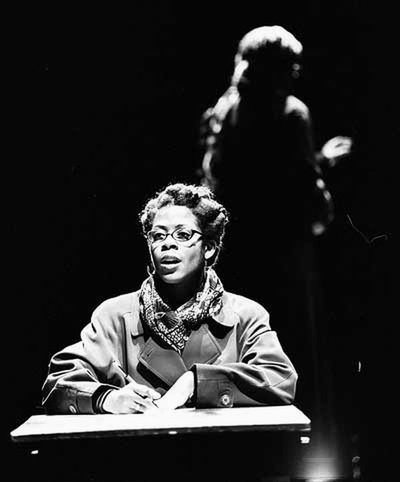December 6, 2001
Play explores racial profiling
For Valerie Curtis-Newton, the theater isn’t just a place to perform plays; it’s “a place for communities to gather to create and experience stories that directly apply to their lives.”
Curtis-Newton, a drama school faculty member, is trying to provide that gathering place with her current production, Sleep Deprivation Chamber, opening this week at the Playhouse Theater. There will be post-play discussions on Friday, Dec. 7 and Wednesday, Dec. 12.
Sleep Deprivation Chamber, based on a real-life incident, is about a young African American man who is stopped late at night for a traffic violation. He is then beaten without provocation and, in a stunning reversal, charged with assault and battery on the police officer who beat him.
“I like to do plays that will spark dialogue,” says Curtis-Newton, who is African American herself. “I thought the relationship between African Americans and the police would be an interesting issue to explore.”
But that isn’t the only reason she chose the play. The author, Adrienne Kennedy (together with her son, Adam Kennedy), is someone whose work Curtis-Newton has admired for a long time and has introduced to students in her classes. “Her plays are challenging for students, but their beauty and imagistic quality gets to the audience in a visceral way,” she says.
Having directed a very realistic play last season, Curtis-Newton was ready for something different. She describes Sleep Deprivation Chamber as “a dreamlike meditation on race, truth and justice.” The play moves back and forth in time and space as protagonist Suzanne Alexander pleads with every official she can think of to clear her son, Teddy, who has been falsely accused. Realistic interrogation scenes are side by side with images from Suzanne’s childhood, scenes involving her troubled brother-in-law and references to Hamlet.
“It was very challenging for my cast, which includes both graduate and undergraduate actors,” Curtis-Newton says. “It’s not a nice neat story; it’s more like a mosaic. But I’m pleased and proud of the ensemble that has developed.”
She adds that the play goes beyond the theme of racial profiling and resonates with the aftermath of Sept. 11. “The characters in Sleep Deprivation Chamber are educated and affluent, and assume they are safe because of that. But they discover they’re not safe, and once you discover that, you never feel safe again.”
Curtis-Newton has done her best to bring in a diverse audience for Sleep Deprivation Chamber, especially for the performances when there will be post-play discussions. Invitations went out to the Human Rights Commission, the police, churches and civic organizations, among others. She will lead the Dec. 7 discussion herself. For Dec. 12, she’s working with the Ethnic Cultural Center to put together a panel.
Working with Curtis-Newton on the production are graduate student designers Mathew Smucker, set; Melanie Burgess, costumes; and Laura Jean Wickman, lights. The play continues through Dec. 16. Tickets are available at the Arts Ticket Office, 4001 University Way N.E., or by calling 206-543-4880.



